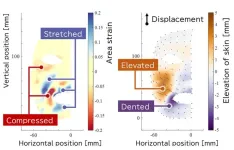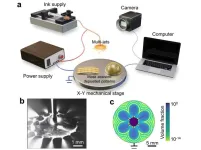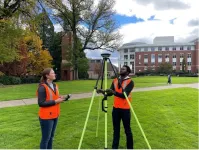(Press-News.org) By Kimberly Flynn
PISCATAWAY, NJ—Sensors in smartphones and smart speakers could help determine a person’s level of alcohol intoxication based on the changes in their voice, according to a new study in the Journal of Studies on Alcohol and Drugs.
Researchers at Stanford Medicine and the University of Toronto conducted a small study of 18 adults ages 21 and up. Participants were given a weight-based dose of alcohol and randomly assigned a series of tongue twisters—one before drinking, and one each hour up to seven hours after drinking.
The participants were asked to read the tongue twister aloud, and a smartphone was placed on a table withing 1 to 2 feet to record their voices. Researchers also measured their breath alcohol concentration at the beginning of the study and every 30 minutes for up to seven hours. They used digital programs to isolate the speaker’s voices, broke them into one-second increments, and analyzed measures such as frequency and pitch.
When checked against breath alcohol results, changes in the participants’ voice patterns as the experiment went on predicted alcohol intoxication with 98% accuracy.
“The accuracy of our model genuinely took me by surprise,” says lead researcher Brian Suffoletto, M.D., associate professor of emergency medicine at Stanford. “While we aren’t pioneers in highlighting the changes in speech characteristics during alcohol intoxication, I firmly believe our superior accuracy stems from our application of cutting-edge advancements in signal processing, acoustic analysis, and machine learning.”
Dr. Suffoletto says the goal of such analysis is to deliver “just-in-time interventions” to prevent injury and death resulting from motor vehicle or other accidents. The best intervention tool would be easy to use and readily available—and the near-ubiquitous nature of smartphones and smart speakers make them an obvious tool for helping alert people that they’ve become intoxicated.
“While one solution could be to frequently check in with someone to gauge their alcohol consumption, doing so could backfire by being annoying (at best) or by prompting drinking (at worst,” he says. “So, imagine if we had a tool capable of passively sampling data from an individual as they went about their daily routines and surveil for changes that could indicate a drinking episode to know when they need help.”
Dr. Suffoletto predicts that surveillance tools may eventually combine several sensors—for example, gait, voice, and texting behavior.
“One primary reason is statistical: integrating test with varying sensitivities and specificities can elevate overall performance,” he says. “Additionally, we cannot always depend on users to provide continuous data inputs. An individual might not speak for hours, but they could be walking. There might be instances where they’re stationary at a bar, neither walking nor talking, yet actively texting.”
Dr. Suffoletto says much larger studies need to be done, on people with a wide variety of ethnic backgrounds, to confirm the validity of voice patterns as an indicator of intoxication. He points out that it may also be helpful to build relationships with companies that are already collecting speech samples through smart speakers. And he sees this research as a call to action, urging the National Institutes of Health to develop data repositories for these types of digital biomarkers.
The ultimate goal is to develop an intervention system that people are willing to use and can help prevent injuries and save lives.
“Timing is paramount when targeting the optimal moment for receptivity and the relevance of real-time support,” he says. “For instance, as someone initiates drinking, a reminder of their consumption limits can be impactful. However, once they’re significantly intoxicated, the efficacy of such interventions diminishes.”
-----
Suffoletto, B., Anwar, A., Glaister, S., & Sejdic, E. Detection of alcohol intoxication using voice features: A controlled laboratory study. Journal of Studies on Alcohol and Drugs, 84, 808-813. doi:10.15288/jsad.22-00375
-----
To arrange an interview with Dr. Brian Suffoletto, please contact Susan Coppa at scoppa@stanford.edu.
-----
The Journal of Studies on Alcohol and Drugs is published by the Center of Alcohol & Substance Use Studies at Rutgers, The State University of New Jersey. It is the oldest substance-related journal published in the United States.
-----
The Journal of Studies on Alcohol and Drugs considers this press release to be in the public domain. Editors may publish this press release in print or electronic form without legal restriction. Please include a byline and citation.
-----
To view the public domain, stock-photo database of alcohol, tobacco and other drug-related images compiled by the Journal of Studies on Alcohol and Drugs, please visit www.jsad.com/photos.
END
Smartphones and smart speakers may be able to detect alcohol intoxication by analyzing voice patterns: Study
2023-11-09
ELSE PRESS RELEASES FROM THIS DATE:
Forests with multiple tree species are 70% more effective as carbon sinks than monoculture forests
2023-11-09
To slow the effects of climate change, conserve biodiversity, and meet the sustainable development goals, replanting trees is vital. Restored forests store carbon within the forest’s soil, shrubs, and trees. Mixed forests are especially effective at carbon storage, as different species with complementary traits can increase overall carbon storage. Compared to single-species forests, mixed forests are also more resilient to pests, diseases, and climatic disturbances, which increases their long-term carbon storage potential. The delivery of other ecosystem services is also greater in mixed species forests, and they support higher levels of biodiversity.
Although the benefits ...
Umbilical cord milking appears to be safe in preterm infants born after 28 weeks
2023-11-09
WHAT:
A treatment to move blood from the umbilical cord into an infant’s body may provide a safe option for preterm infants born after 28 weeks who need rapid support, suggests a study supported by the National Institutes of Health. The procedure, called umbilical cord milking, involves gently squeezing the cord between the thumb and forefinger and pushing the blood into the newborn’s abdomen. The new findings suggest that concerns raised by a 2019 study of infants born before 28 weeks—which concluded that umbilical cord milking might increase the risk of bleeding inside the brain—do not apply to preterm infants born after 28 weeks. The ...
How human faces can teach androids to smile
2023-11-09
Osaka, Japan – Robots able to display human emotion have long been a mainstay of science fiction stories. Now, Japanese researchers have been studying the mechanical details of real human facial expressions to bring those stories closer to reality.
In a recent study published by the Mechanical Engineering Journal, a multi-institutional research team led by Osaka University have begun mapping out the intricacies of human facial movements. The researchers used 125 tracking markers attached to a person’s face to closely examine 44 different, singular facial actions, such as blinking or raising the corner of the mouth.
Every facial expression comes with a variety of local deformation ...
Grant helps program expand distracted driving education to online learning
2023-11-09
The National Highway Traffic Safety Administration (NHTSA) estimates there were 42,795 deaths resulting from motor vehicle crashes in 2022 in the United States. This projection is close to the previous year fatality numbers, which were the highest in 16 years.
A Herbert Wertheim School of Public Health and Human Longevity Science at University of California San Diego program aims to improve safety for all roadway users, including drivers, pedestrians and cyclists with support from a $360,000 grant from the California Office of Traffic Safety through the NHTSA.
To inform and promote safe driving, the UC San Diego Training, Research and Education for Driving Safety (TREDS) provides ...
HKUST researchers develop low-cost and multifunctional microprinter for ultrafast piezoelectric material printing
2023-11-09
A research team led by The Hong Kong University of Science and Technology (HKUST) has developed a microprinter that can print piezoelectric films 100 times faster for the production of microelectromechanical systems (MEMS) for sensors, wearable or implantable medical devices, offering the possibility to lower the mass production costs.
The microprinter, built at a comparatively lower cost as compared with other printers on the market, utilizes an electrostatic field to propel streams of ink onto a platform, allowing for efficient manipulation of thin film patterns and enhanced printing speed to address the challenge of mass production ...
Oregon State to receive $6.5M for federal effort to modernize geospatial coordinate system
2023-11-09
CORVALLIS, Ore. – Oregon State University is one of four institutions selected to advance a federal effort to modernize the National Spatial Reference System, which underpins surveying, mapping, autonomous vehicle navigation, precision agriculture and the rest of the United States’ geospatial economy.
OSU will receive $6.5 million over five years from the National Oceanic and Atmospheric Administration for research to be conducted by the new Geospatial Center for the Arctic and Pacific, or GCAP. The funding is through NOAA’s National Geodetic Survey and is part of nearly $20 million awarded overall.
The other funding ...
The Lancet: Studying medicine, Nazism, and the Holocaust crucial to strengthening medical education and ethics today
2023-11-09
Peer-reviewed/ review, analysis and opinion
The Lancet: Studying medicine, Nazism, and the Holocaust crucial to strengthening medical education and ethics today
Most comprehensive report to date on medical atrocities under Nazism and during the Holocaust – and their implications for today – details the central role health professionals played in formulating and carrying out the antisemitic, racist, and inhumane policies and practices during the Nazi regime.
The Commission challenges long-held misconceptions about medicine in the Nazi era, including the claim that medical crimes were carried out by only a ...
New study examines long term effectiveness of live shingles vaccine
2023-11-09
The effectiveness of live zoster (shingles) vaccine is highest in the first year after vaccination and then wanes substantially. But it continues to provide some protection against shingles and its complications ten years after vaccination, even in patients with a weakened immune system, finds a study published by The BMJ.
Vaccine effectiveness is a measure of how well vaccines work to protect communities in the real world.
Herpes zoster, commonly known as shingles, is a painful rash caused by reactivation of the chickenpox virus. It’s much more common among people aged 60 and older and those with a weakened ...
Latest results from PHOEBE trial show patients with advanced HER2-positive breast cancer live longer on pyrotinib
2023-11-09
Lisbon, Portugal: Patients with HER2-positive breast cancer that has started to spread to other parts of the body survive for longer if they are treated with a new drug called pyrotinib, according to results from the longest follow-up of the PHOEBE randomised clinical trial in China.
Presenting the latest results at the Advanced Breast Cancer Seventh International Consensus Conference (ABC 7), Professor Xichun Hu, of Fudan University Cancer Hospital, Shanghai, China, said the researchers had been able to analyse data on overall survival from the trial up to March 15, ...
Barnacle bends shape to fend off warm-water sea snails on the move
2023-11-09
Some barnacles are ‘morphing’ to protect themselves from predatory warm-water sea snails, which are expanding into their territory due to climate change.
Research led by the University of Southampton and published in the Journal of Biogeography shows how temperate prey species are adapting to changing water temperatures, which carry the threat of warm-water predators encroaching into their territory.
As global sea-surface temperatures rise and the number of marine heatwaves increase under global heating, coastal marine communities are changing. Warm-water predators ...





